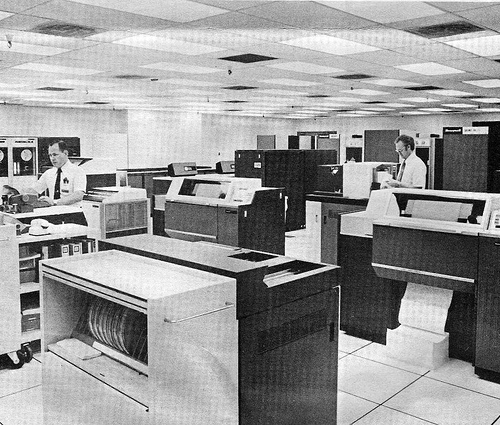2 Oct 2009
0 CommentsMobileMondayToronto – Striving for Canadian Leadership in Global Mobile
Through the 1960’s, 1970’s and into the early 1980’s, Canada leveraged many of its best minds to develop technology solutions that span the great distances and empty spaces in our vast country to position Canada as a world leader in Telecommunications. Today, numerous examples from world leading companies like Blackberry to startups like Viigo or Iotum continue to show world leadership.
Notwithstanding these points of strength, in the early 21st Century, there are surprising gaps in our global ability to compete, given our early leadership. The causes are many from regulation, standards, finance and even investment decisions of major carrier players. While there are individual success stories, like the Blackberry, there are also numerous structural issues that dampen our natural competitive position in this all important industry.
We’ve assembled a diverse team of some of the top players shaping our mobile futureo help us understand Canada’s position in the global mobile industry, where the opportunities lie and changes in policy and investment that might allow us to maximize our footprint in the future mobile industry:
 Bob Ferchat – a Canadian mobile pioneer at the epicentre of the aforementioned world class Canadian telecom and mobile industry. Bob was CEO of Nortel Networks and later of Bell Mobility. Now retired, he has maintained a passion to continue Canadian mobile leadership. Most notably, a few months ago, he led a group of investors that tried to buy back Nortel to keep that treasure trove of technology intellectual property in Canadian hands Ottawa Citizen – Fight for Nortel Wireless in Full Swing.
Bob Ferchat – a Canadian mobile pioneer at the epicentre of the aforementioned world class Canadian telecom and mobile industry. Bob was CEO of Nortel Networks and later of Bell Mobility. Now retired, he has maintained a passion to continue Canadian mobile leadership. Most notably, a few months ago, he led a group of investors that tried to buy back Nortel to keep that treasure trove of technology intellectual property in Canadian hands Ottawa Citizen – Fight for Nortel Wireless in Full Swing. Karna Gupta – From an early career in various senior executive positions at Bell Canada, Karna has held numerous and diverse C-level positions in global mobile and enterprise software companies, including Comverse, Sitraka Mobile and OSS Solutions. Most recently, he was CEO of Certicom through their recent acquisition by RIM, that also included fighting a hostile takeover bid. Karna brings a great international perspective from a diverse set of predominantly software-based initiatives.
Karna Gupta – From an early career in various senior executive positions at Bell Canada, Karna has held numerous and diverse C-level positions in global mobile and enterprise software companies, including Comverse, Sitraka Mobile and OSS Solutions. Most recently, he was CEO of Certicom through their recent acquisition by RIM, that also included fighting a hostile takeover bid. Karna brings a great international perspective from a diverse set of predominantly software-based initiatives. Steven Woods – Currently heading up Google’s Waterloo site, which has a significant mobile product mandate including search and GMail, Steve recently returned to Canada from a decade in the Silicon Valley. He was founder of NeoEdge Networks and co-founder of Quack.com (acquired by AOL), both Silicon Valley-Ontario operations. It would appear that Steve and his team are in the centre of the new web-based mobile world that Google is helping to shape.
Steven Woods – Currently heading up Google’s Waterloo site, which has a significant mobile product mandate including search and GMail, Steve recently returned to Canada from a decade in the Silicon Valley. He was founder of NeoEdge Networks and co-founder of Quack.com (acquired by AOL), both Silicon Valley-Ontario operations. It would appear that Steve and his team are in the centre of the new web-based mobile world that Google is helping to shape.
There is a huge opportunity for Canadian companies, and our entire economy, but to seize that opportunity good policy and well informed decision makers is important. To that end, we’ll answer questions about the mobile tech company ecosystem like:
- How did we get where we we are today?
- How do we compare with the world?
- What policies and initiatives might improve our competitive position?
- What are some of the major gaps that Canada might be well positioned to fill?
Although, with the generous assistance of sponsors, this is a free event, you’ll need to register and it may well sell out. More information and the registration can be found here: Mobile Monday Toronto @ MaRS – Cnadian Leadership in Mobile and Communications.
I’d be very interested if people would comment on any topics or issues you wish to have raised. Even better, come out and ask those questions yourself. It promises to be an insightful evening.





 I first used computers at age 14, after being invited with a set of Math Contest winners to the University of Waterloo where I had the pleasure of using APL an early math-based timesharing system running on an IBM 360/44 . It is notable that, rather than learning the standard Fortran and programming on punch cards, I started programming using an IBM 2741, which is like an online IBM Selectric typewriter (typeball and all) connected via modem, with acoustic coupler, at 134.5 baud. Prior to this, I had read about computers and thought about them abstractly, but the plain truth is that computers were only accessible to a very small, privileged elite.
I first used computers at age 14, after being invited with a set of Math Contest winners to the University of Waterloo where I had the pleasure of using APL an early math-based timesharing system running on an IBM 360/44 . It is notable that, rather than learning the standard Fortran and programming on punch cards, I started programming using an IBM 2741, which is like an online IBM Selectric typewriter (typeball and all) connected via modem, with acoustic coupler, at 134.5 baud. Prior to this, I had read about computers and thought about them abstractly, but the plain truth is that computers were only accessible to a very small, privileged elite. Recently, a friend sent me the directory listing of an old backup tape for the Honeywell 6050 TSS system which reminded me that I first used email in 1975. Yes, we even had mailbox and mbox files way back then. Of course, the email system only connected the almost 1000 users of this computer, yet barely two years later my friend Bill Pase then working at IP Sharp Associates, connected me into a truly global email system run by that pioneering firm. This is primarily of interest because many people I talk to assume that email began in the late 1990’s.
Recently, a friend sent me the directory listing of an old backup tape for the Honeywell 6050 TSS system which reminded me that I first used email in 1975. Yes, we even had mailbox and mbox files way back then. Of course, the email system only connected the almost 1000 users of this computer, yet barely two years later my friend Bill Pase then working at IP Sharp Associates, connected me into a truly global email system run by that pioneering firm. This is primarily of interest because many people I talk to assume that email began in the late 1990’s. Around 1990, while CEO at
Around 1990, while CEO at 
 Now what? You’ll want to evolve a business model that helps viral adoption, yet still allows for effective monetization of your great new application. Below are the three main web-based models you may wish to consider:
Now what? You’ll want to evolve a business model that helps viral adoption, yet still allows for effective monetization of your great new application. Below are the three main web-based models you may wish to consider: 2. Free: Since the early days of the web, sites like Yahoo!, and more recently Google and Skype, based on web economics and culture offer a high level of service and utility for the amazingly low price of free. Free continues to be the pricing model of choice for consumer web users. Notwithstanding the lowered costs to provide such services, the old adage of “make it up in volume” doesn’t get you very far toward cash flow positive. That’s one of the key paradoxes of the web, how to balance consumer desire for free with the need to make money.
2. Free: Since the early days of the web, sites like Yahoo!, and more recently Google and Skype, based on web economics and culture offer a high level of service and utility for the amazingly low price of free. Free continues to be the pricing model of choice for consumer web users. Notwithstanding the lowered costs to provide such services, the old adage of “make it up in volume” doesn’t get you very far toward cash flow positive. That’s one of the key paradoxes of the web, how to balance consumer desire for free with the need to make money. 3. Freemium: As a hybrid of Subscription and Free, this model was first popularized in 2006 by
3. Freemium: As a hybrid of Subscription and Free, this model was first popularized in 2006 by 
 Speaking of trust, a week ago a good friend lent me a fascinating book called
Speaking of trust, a week ago a good friend lent me a fascinating book called  Can We Trust Their Claims of Open?
Can We Trust Their Claims of Open?
 In a blog post back in April
In a blog post back in April 

 No, not like this!
No, not like this!
1 Jan 2010
0 CommentsTechnology Visionaries in the 1990’s: A 21st Century Retrospective
Recently, I unearthed a 10 year old book by Bill Gates, Business @ the Speed of Thought and took a bit of time to re-scan that 1999 book. On the first day of 2010, it seems appropriate to study technology trends to help give perspective to the future of the digital revolution.
Far from being an overtly partisan paen to Microsoft, the passion and enthusiam for change reflective both Bill Gates personality and the thinking of that era, shine through.
What is being presented is a prescription for a world, focused primarily on business, where mass adoption of networked computing unleashes a digital, knowledge-based revolution.
In the 1990’s, Information Technology (“IT”) was considered a “necessary evil” in business, being viewed largely as a cost centre, and consigned to report to the CFO with a major focus on cost control. Although we’ve made some progress in the last decade, there is still a huge need to educate all business people on how essential IT is to creating competitive advantage, mitigating risk and enabling new products and services. In essence, IT and the modern business, are inseparably intertwined. He suggests the notion of a “Digital Nervous System” as shorthand for a set of best practices for business to use. Although this short hand hasn’t really caught on, the ideas behind it remain.
And yet, it is easy to dismiss much of this early prosletyzing as impractical dreaming, a fact that the “dot com meltdown” probably exacerbated. So, how much of the 1990’s vision makes sense today?
Somewhat surprisingly, the answer is most of it. While some trends were completely unticipated by Bill Gates, and most of his peers in the 1990’s:
many of the predictions and recommendations remain true or have gone from vision to reality:
In summary, much of the 1990’s technological vision was spot on. Obviously, it has taken far longer to bring into practice than people then suggested. However, compared to other societal changes, the march of digital technologies has been ligthening fast.
Although it is less fashionable to be a technology visionary today, I believe we still need to look ahead to our future. There remain many unsolved issues IT and, even more important, there are countless opportunities that future digital technologies will be able to deliver. Business leaders, governments and concerned citizens all need to understand and contribute to shaping a future world that will be both efficient, yet retain a good quality of life for us all. A long term perspective remains important because business investments and decisions have a surprisingly long lifespan.
Thus, the promise of the digital revolution continues, and it will be improved by thinkers who can help us to shape our desired future.